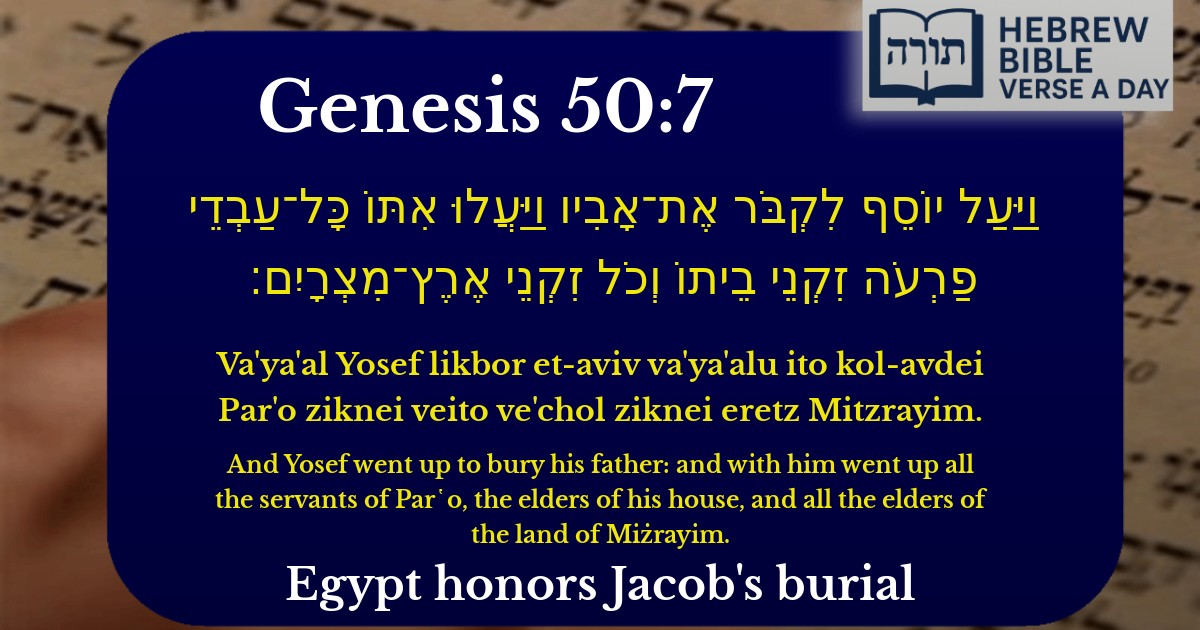Join Our Newsletter To Be Informed When New Videos Are Posted
Join the thousands of fellow Studends who rely on our videos to learn how to read the bible in Hebrew for free!
Hebrew Text
וַיַּעַל יוֹסֵף לִקְבֹּר אֶת־אָבִיו וַיַּעֲלוּ אִתּוֹ כָּל־עַבְדֵי פַרְעֹה זִקְנֵי בֵיתוֹ וְכֹל זִקְנֵי אֶרֶץ־מִצְרָיִם׃
English Translation
And Yosef went up to bury his father: and with him went up all the servants of Par῾o, the elders of his house, and all the elders of the land of Miżrayim.
Transliteration
Va'ya'al Yosef likbor et-aviv va'ya'alu ito kol-avdei Par'o ziknei veito ve'chol ziknei eretz Mitzrayim.
Hebrew Leining Text
וַיַּ֥עַל יוֹסֵ֖ף לִקְבֹּ֣ר אֶת־אָבִ֑יו וַיַּֽעֲל֨וּ אִתּ֜וֹ כׇּל־עַבְדֵ֤י פַרְעֹה֙ זִקְנֵ֣י בֵית֔וֹ וְכֹ֖ל זִקְנֵ֥י אֶֽרֶץ־מִצְרָֽיִם׃
וַיַּ֥עַל יוֹסֵ֖ף לִקְבֹּ֣ר אֶת־אָבִ֑יו וַיַּֽעֲל֨וּ אִתּ֜וֹ כׇּל־עַבְדֵ֤י פַרְעֹה֙ זִקְנֵ֣י בֵית֔וֹ וְכֹ֖ל זִקְנֵ֥י אֶֽרֶץ־מִצְרָֽיִם׃
🎵 Listen to leining
Parasha Commentary
📚 Talmud Citations
This verse is not quoted in the Talmud.


The Significance of Yosef's Burial Procession
The verse describes the grand procession accompanying Yosef to bury his father Yaakov in the land of Canaan. The participation of Pharaoh's servants, the elders of his household, and the elders of Egypt highlights the immense honor accorded to Yaakov. Rashi (Bereshit 50:7) explains that this demonstrates how the Egyptians recognized Yaakov's righteousness and the divine blessing he brought to Egypt during the famine. The presence of Egyptian nobility also fulfilled the prophecy given to Avraham in Bereshit 15:14 that his descendants would leave Egypt with great wealth - this honor foreshadowed that eventual exodus.
The Role of Egyptian Dignitaries
The Midrash (Tanchuma Vayechi 16) notes that the Egyptian participation wasn't merely ceremonial. The Talmud (Sotah 13a) states that the Egyptian elders actually accompanied the procession all the way to Canaan, not just to the border. This extraordinary measure was taken because:
Spiritual Dimensions of the Event
The Rambam (Moreh Nevuchim 3:48) sees in this event a demonstration of how even non-Jews can recognize true righteousness. The Kli Yakar (Bereshit 50:7) adds that the Egyptian participation served to publicize the honor of the Jewish people and their ancestral covenant with the land of Canaan. This public display helped establish the Jewish claim to the land for future generations.
Halachic Insights
The Shulchan Aruch (Yoreh De'ah 357:1) derives from this verse that it is proper to accompany the dead for burial, as even the Egyptians recognized this important mitzvah. The participation of Egyptian leadership sets a precedent for the importance of honoring the deceased, particularly righteous individuals. The Netziv (Ha'amek Davar) notes that the verse emphasizes "all" the elders to teach that honoring the righteous should involve the entire community's participation.